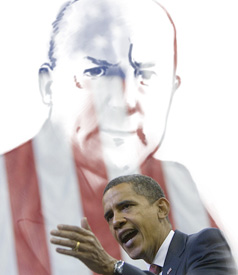Building a Different Middle East
By Joel Beinin
The mobilizations are rooted in the particular dynamics of each village and depend on the balance of local political forces, family dynamics and economic factors like the possibility of obtaining permits to work in Israel. Together they form a peasant-based social movement that is becoming increasingly conscious of its political significance and filling the void in Palestinian leadership created by the futile struggle between the Palestinian Authority, dominated by Fatah, and Hamas, which controls the Gaza Strip.
Is this movement likely to contribute to a resolution of the conflict anytime soon? 'Ayid Mrar is doubtful. "I don't know when the occupation will end," he says. "Not in one or two years. Maybe in a hundred. If the Palestinian people achieve their freedom, we don't want relations of enmity with Israel. We want to build a different Middle East."


